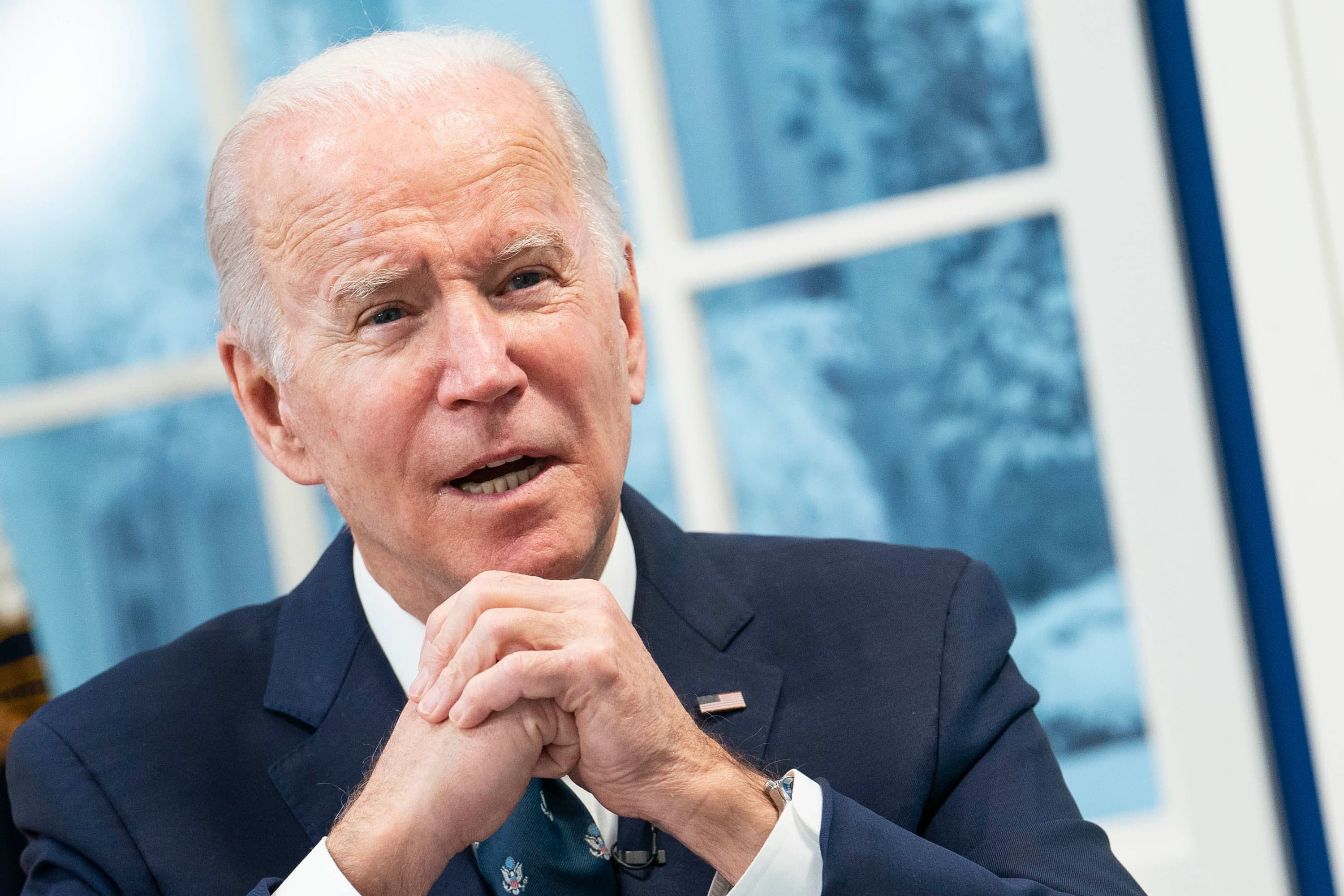
U.S. President Joe Biden speaks during a virtual meeting about reducing the costs of meat through increased competition in the meat processing industry in the South Court Auditorium at the Eisenhower Executive Office Building on January 3, 2022 in Washington, DC.
Sarah Silbiger | Getty Images
WASHINGTON – President Joe Biden met virtually with family farmers and ranchers on Monday to highlight his administration’s ongoing effort to support independent meat processors, and to pressure the four biggest meatpacking companies into easing prices for consumers.
With meat and poultry prices leading the broader nationwide increase in the cost of groceries, the White House has spent months arguing that anti-competitive consolidation within the meatpacking industry is to blame for the soaring prices.
Four companies – Tyson, JBS, Marfrig and Seaboard – control as much as 85% of the nationwide meatpacking business, according to a White House estimate.
Overall, the price of groceries has climbed 6.4% over the past year, according to November data from the U.S. Department of Agriculture. Yet meat, poultry, fish and egg prices have grown even more over the same period, at a rate of 12.8%.
“While profits go up [at the biggest meatpackers], the prices you see at the grocery stores go up commensurate,” Biden said at the Monday event at the White House.
At the same time, he said, “the prices farmers receive for the products that they are bringing to market go down. This reflects the market being distorted by lack of competition.”
The administration’s plan to tackle this lack of competition is centered around supporting smaller and independent meatpackers, essentially creating new competition for the big four.
“Capitalism without competition isn’t capitalism. It’s exploitation,” Biden said. “That’s what we’re seeing in the meat and poultry” industries, he added.
The industry pushed back on Biden’s remarks. Following the White House event, Julie Anna Potts, president of the North American Meat Institute, a leading meatpacking industry group said Monday the White House was ignoring the number one challenge facing the meatpacking industry: labor shortages.
“Press conferences and using taxpayer dollars to establish government-sponsored packing and processing plants will not do anything to address the lack of labor at meat and poultry plants and spiking inflation across the economy,” Potts said in a statement to CNBC.
“The Administration wants the American people to believe that the meat and poultry industry is unique and not experiencing the same problems causing inflation across the economy, like increased input costs, increased energy costs, labor shortages and transportation challenges,” said Potts. “Consumers know better.”
Accompanied by Attorney General Merrick Garland and Agriculture Secretary Tom Vilsack, Biden detailed an effort underway at USDA to allocate around $1 billion in Covid relief funds to support independent meatpackers and lower barriers of entry to the industry.
While the White House billed the event as a major “announcement” of an “action plan,” most of the individual pieces that make up the plan have already been announced, some as early as July of last year.
They include approximately $375 million in gap financing grants to assist independent meat processors in expanding their capacity in order to better compete with the industries dominant players.
The plan also includes $100 million in loan guarantees to private lenders, which the USDA hopes will help make up to $1 billion of new lending available immediately to help build new food storage and distribution infrastructure. These loan guarantees were first announced in December of last year.
Another $275 million will be allocated towards closing an existing credit gap for independent meatpackers, according to a White House fact sheet released Monday. This money appears to be part of a $500 million block of funds that was first announced by Vilsack in July of last year.
Another element of Biden’s action plan involves greater coordination between the Department of Justice and the Department of Agriculture to crack down on illegal anti-competitive practices across the food industry.
Garland and Vilsack announced Monday that within 30 days a new online portal will be launched for the public to report potential violations of market competition laws.
The politics of inflation
On a broader level, however, the White House effort to blame big meatpackers for food price inflation has its roots at least partly in politics.
Polls consistently show that inflation is Americans’ biggest economic concern. Public anger about high prices has helped to drive Biden’s approval ratings down to record lows in recent months.
It also helped contribute to the collapse late last month of Biden’s signature domestic spending bill, the Build Back Better Act.
After passing the House last year, the legislation fell apart in the Senate when Sen. Joe Manchin, a conservative Democrat from deep-red West Virginia, cited inflation as a chief reason he could not support the approximately $1.75 trillion bill, which contained transformative investments in the social safety net and renewable energy.
Yet economists say there is little Biden can do in the short term to turn around inflationary trends that are driven by pandemic-fueled economic shifts and disruptions around the world.
Meanwhile, Biden’s own administration recently admitted that the surge in meat and poultry prices was being driven by the same factors that are driving price hikes everywhere else: high demand, fewer available workers and a global supply chain struggling to recover from two years of pandemic.
USDA’s food-at-home index, which tracks consumer food prices, said in its report last month that the price of meat, poultry and eggs was “driven up by strong domestic and international demand, labor shortages, supply chain disruptions, and high feed and other input costs.”




